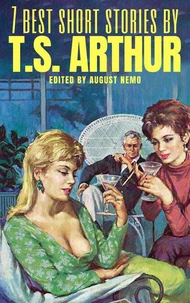The Iron Rule; Or, Tyranny in the Household. Lessons in Family Harmony: A Moral Tale of Household Authority and Compassion
Par :Formats :
Disponible dans votre compte client Decitre ou Furet du Nord dès validation de votre commande. Le format ePub est :
- Compatible avec une lecture sur My Vivlio (smartphone, tablette, ordinateur)
- Compatible avec une lecture sur liseuses Vivlio
- Pour les liseuses autres que Vivlio, vous devez utiliser le logiciel Adobe Digital Edition. Non compatible avec la lecture sur les liseuses Kindle, Remarkable et Sony
 , qui est-ce ?
, qui est-ce ?Notre partenaire de plateforme de lecture numérique où vous retrouverez l'ensemble de vos ebooks gratuitement
Pour en savoir plus sur nos ebooks, consultez notre aide en ligne ici
- Nombre de pages85
- FormatePub
- ISBN406-4-06-620287-3
- EAN4064066202873
- Date de parution19/05/2021
- Protection num.Digital Watermarking
- Taille483 Ko
- Infos supplémentairesepub
- ÉditeurGOOD PRESS
Résumé
In "The Iron Rule; Or, Tyranny in the Household, " T. S. Arthur crafts a poignant narrative that examines the intricate dynamics of domestic life and the often-overlooked tyranny that can occur within the family setting. Written in the mid-19th century, this work employs a didactic style, blending realist observation with moral critique, as it delves into the psychological and social implications of authority, especially within the patriarchal household.
Arthur's prose is imbued with emotional depth, illuminating the struggles of both the oppressed and the oppressors in a society grappling with the evolving roles of gender and power. T. S. Arthur was a prominent American author and reformer whose engagement with social issues reflects his own commitment to moral and ethical improvement. His experiences as a temperance advocate and an observer of societal norms heavily influenced his writing.
Arthur sought to illuminate the darker aspects of domestic life, making this work a critical commentary on the effects of oppressive familial structures and the urgent need for reform in personal relationships, particularly concerning gender equity. Readers interested in social reform literature or the historical portrayal of domesticity will find "The Iron Rule" an essential read. It not only serves as a compelling narrative but also as a catalyst for reflection on the moral responsibilities of individuals within the family unit.
This book invites readers to consider the implications of authority and empathy, making it a timeless exploration of household dynamics.
Arthur's prose is imbued with emotional depth, illuminating the struggles of both the oppressed and the oppressors in a society grappling with the evolving roles of gender and power. T. S. Arthur was a prominent American author and reformer whose engagement with social issues reflects his own commitment to moral and ethical improvement. His experiences as a temperance advocate and an observer of societal norms heavily influenced his writing.
Arthur sought to illuminate the darker aspects of domestic life, making this work a critical commentary on the effects of oppressive familial structures and the urgent need for reform in personal relationships, particularly concerning gender equity. Readers interested in social reform literature or the historical portrayal of domesticity will find "The Iron Rule" an essential read. It not only serves as a compelling narrative but also as a catalyst for reflection on the moral responsibilities of individuals within the family unit.
This book invites readers to consider the implications of authority and empathy, making it a timeless exploration of household dynamics.
In "The Iron Rule; Or, Tyranny in the Household, " T. S. Arthur crafts a poignant narrative that examines the intricate dynamics of domestic life and the often-overlooked tyranny that can occur within the family setting. Written in the mid-19th century, this work employs a didactic style, blending realist observation with moral critique, as it delves into the psychological and social implications of authority, especially within the patriarchal household.
Arthur's prose is imbued with emotional depth, illuminating the struggles of both the oppressed and the oppressors in a society grappling with the evolving roles of gender and power. T. S. Arthur was a prominent American author and reformer whose engagement with social issues reflects his own commitment to moral and ethical improvement. His experiences as a temperance advocate and an observer of societal norms heavily influenced his writing.
Arthur sought to illuminate the darker aspects of domestic life, making this work a critical commentary on the effects of oppressive familial structures and the urgent need for reform in personal relationships, particularly concerning gender equity. Readers interested in social reform literature or the historical portrayal of domesticity will find "The Iron Rule" an essential read. It not only serves as a compelling narrative but also as a catalyst for reflection on the moral responsibilities of individuals within the family unit.
This book invites readers to consider the implications of authority and empathy, making it a timeless exploration of household dynamics.
Arthur's prose is imbued with emotional depth, illuminating the struggles of both the oppressed and the oppressors in a society grappling with the evolving roles of gender and power. T. S. Arthur was a prominent American author and reformer whose engagement with social issues reflects his own commitment to moral and ethical improvement. His experiences as a temperance advocate and an observer of societal norms heavily influenced his writing.
Arthur sought to illuminate the darker aspects of domestic life, making this work a critical commentary on the effects of oppressive familial structures and the urgent need for reform in personal relationships, particularly concerning gender equity. Readers interested in social reform literature or the historical portrayal of domesticity will find "The Iron Rule" an essential read. It not only serves as a compelling narrative but also as a catalyst for reflection on the moral responsibilities of individuals within the family unit.
This book invites readers to consider the implications of authority and empathy, making it a timeless exploration of household dynamics.








